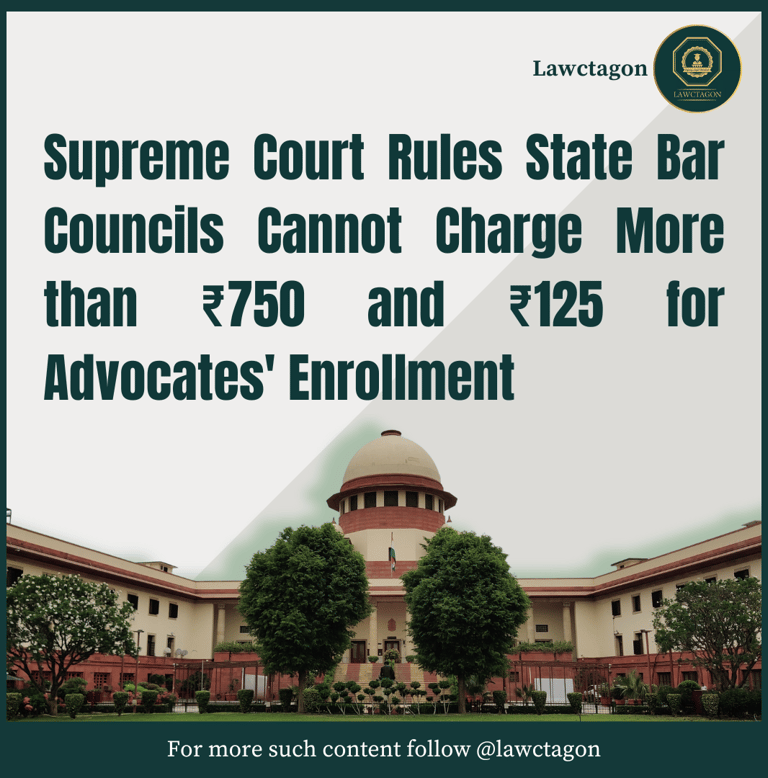Supreme Court Rules State Bar Councils Cannot Charge More than ₹750 and ₹125 for Advocates' Enrollment
Read the full judgement summary and analysis.
LEGAL NEWS
8/4/20244 min read


Introduction
In a landmark judgment delivered on July 30, 2024, the Supreme Court of India addressed the contentious issue of enrolment fees charged by State Bar Councils (SBCs). The Court held that the fees levied by SBCs at the time of admission to the Bar must not exceed the statutory limit prescribed under Section 24(1)(f) of the Advocates Act, 1961. This decision underscores the importance of fiscal discipline and equality in the legal profession, aligning with the constitutional mandates of Article 14 and Article 19(1)(g).
Background
The Advocates Act, 1961, was enacted to consolidate and amend the laws relating to legal practitioners and to constitute a unified Bar for the entire country. The Act established the Bar Council of India (BCI) and various SBCs, outlining their functions, including the enrolment of advocates. Section 24(1)(f) of the Act prescribes the enrolment fee that SBCs can charge, intending to foster an inclusive Bar by keeping the fees reasonable and uniform across states.
However, over the years, SBCs began imposing additional miscellaneous fees under various nomenclatures, cumulatively exceeding the statutory limit. This practice was challenged as being contrary to the legislative intent and the constitutional principles of equality and reasonable restriction on professional practice.
Facts of the Case
The petitioners in this case challenged the validity of the enrolment fees charged by various SBCs, arguing that these fees were exorbitant and beyond the statutory mandate. They contended that the additional fees imposed by SBCs created barriers to entry into the legal profession, particularly affecting economically disadvantaged aspirants.
The SBCs, on the other hand, justified the additional fees on the grounds of covering the costs associated with their functions, including maintaining rolls of advocates, conducting disciplinary proceedings, and other administrative expenses. They argued that the statutory fee prescribed under Section 24(1)(f) was insufficient to meet these expenses.
Issues Raised
The primary issues before the Supreme Court were:
1. Whether the SBCs could levy fees beyond the statutory limit prescribed under Section 24(1)(f) of the Advocates Act, 1961.
2. Whether the imposition of additional fees violated the constitutional rights under Article 14 (Right to Equality) and Article 19(1)(g) (Right to Practice Profession) of the Constitution of India.
3. Whether the BCI had the authority to revise enrolment fees through resolutions, contrary to the express provisions of the Advocates Act.
Court's Analysis
The Supreme Court, in its detailed judgment authored by Chief Justice Dr. Dhananjaya Y Chandrachud, analyzed the legislative history and intent behind the Advocates Act. The Court emphasized that the enrolment fee prescribed under Section 24(1)(f) was intended to cover all functions carried out by the SBCs and BCI. The legislative history indicated a clear intent to keep the fees minimal to ensure broad access to the legal profession.
The Court held that the decision of SBCs to impose fees beyond the statutory limit was contrary to the legislative scheme and amounted to creating new substantive obligations not contemplated by the Act. It noted that the additional fees imposed by SBCs were arbitrary and discriminatory, violating the constitutional principles of substantive equality under Article 14 and reasonableness under Article 19(1)(g).
In their analysis, the Justices referred to precedents and legislative debates to underscore that the primary objective of the Advocates Act was to maintain a uniform and affordable fee structure across the country. The imposition of excessive fees by some SBCs disrupted this uniformity and placed undue financial burdens on aspiring advocates, thus creating inequity in access to the profession.
Decision of the Court
The Supreme Court concluded that:
1. SBCs cannot charge enrolment fees beyond the statutory limit prescribed under Section 24(1)(f) of the Advocates Act, 1961.
2. Any fees imposed by SBCs at the time of enrolment, other than the statutory fee and stamp duty, are invalid and violate Articles 14 and 19(1)(g) of the Constitution.
3. The BCI does not have the authority to revise the enrolment fees through resolutions, as this power lies solely with the legislature.
The Court declared that the judgment would have a prospective effect, meaning that SBCs are not required to refund the excess fees collected before the date of this judgment. This decision aims to strike a balance between enforcing the law and maintaining the financial stability of SBCs, which have been relying on these fees for their functioning.
Implications of the Judgment
This judgment has significant implications for the legal profession in India. By reinforcing the statutory limits on enrolment fees, the Supreme Court has made a clear statement about the importance of affordability and accessibility in the legal field. This decision is likely to have several far-reaching effects:
1. Financial Relief for Aspiring Advocates: Many law graduates who were previously deterred by high enrolment fees can now pursue their ambition to practice law without facing prohibitive costs. This will particularly benefit those from economically weaker sections of society, promoting diversity within the legal profession.
2. Increased Accountability for SBCs: The ruling mandates that SBCs operate within the financial constraints set by the Advocates Act. This will necessitate greater transparency and accountability in their financial management and administrative practices.
3. Uniformity Across States: The judgment ensures that the enrolment process and associated fees are uniform across all states, thus preventing disparities and promoting a cohesive national Bar. This uniformity is crucial for maintaining the integrity and unity of the legal profession in India.
4. Potential Legislative Reforms: The decision may prompt the legislature to review and possibly amend the provisions of the Advocates Act to address any practical difficulties faced by SBCs in managing their finances. It could also lead to broader reforms aimed at improving the overall regulatory framework governing the legal profession.
Conclusion
The Supreme Court's judgment is a significant step towards ensuring fiscal discipline and equality in the legal profession. By reiterating the statutory limits on enrolment fees, the Court has reinforced the legislative intent of making the legal profession accessible to all, regardless of economic background. This decision not only upholds the rule of law but also ensures that the entry into the legal profession remains fair and equitable.
This landmark ruling will have a far-reaching impact on the functioning of SBCs and the BCI, ensuring that their powers are exercised within the framework of the law. It serves as a reminder that statutory bodies must adhere to the legislative mandates and constitutional principles while discharging their functions.
The judgment also highlights the judiciary's role in safeguarding constitutional values and ensuring that the legislative intent is honored in practice. As the legal profession continues to evolve, such judicial interventions are crucial in maintaining the balance between regulatory oversight and the fundamental rights of individuals. This decision is a testament to the judiciary's commitment to upholding justice, equity, and the rule of law in India.


